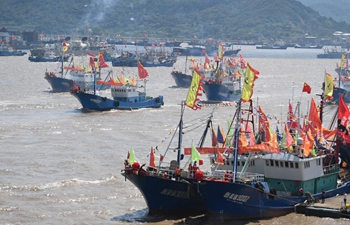NICOSIA, Sept. 17 (Xinhua) -- Cyprus and Greek are planning to jointly demand a new European policy on migration as both countries are shouldering an undue burden, Cyprus' Interior Minister Constantinos Petrides said on Tuesday.
"It is high time frontline countries in the Eastern Mediterranean put forward their own priorities, given the massive flow of irregular migration in the region," Petrides said.
He added that he and Greece's Alternate Minister for Citizen Protection responsible for migration, Giorgos Koumoutsakos, decided in talks on Monday that the two countries should coordinate their actions ahead of an EU internal affairs council meeting on Oct. 8 in Brussels.
Petrides said the decision was made "in view of EU's hitherto inability to create a holistic framework for immigration policy."
"The phenomenon of increased and massive migration flows from the Eastern Mediterranean route needs to be further highlighted and we must see it transformed into a policy at European level, a framework in which the principle of solidarity is translated into action and not just into financial aid," Petrides added.
"The situation continues to deteriorate, leading to a complete overload of the social and economic structures of the island," the minister said.
The meeting of the two ministers came on the same day when a report by the European border agency Frontex said that during August, 2019 there had been 9,300 detections of irregular immigrants in the eastern Mediterranean route, doubling the number of immigrants who arrive in Greek islands in August, 2018.
Cyprus was excluded from the statistics, says a footnote in the Frontex report without explanation.
But Petrides said that there was an increase of 50 percent in immigrant arrivals in 2017 over 2016, and a 69-percent increase in 2018 relative to 2017.
He said the "alarming trend" continued this year, with 7,812 new asylum applicants arriving until July.
"According to the available data of Eurostat and European Asylum Support Office (EASO), for the third year in a row, Cyprus remains the top receiving member state per capita," Petrides said.
Petrides said that Syrians remained the top nationality in asylum seekers, but "new alarming trends are emerging, as the significant influx of citizens of Georgia, as well as of India, Cameroon, Nigeria and Bangladesh."













